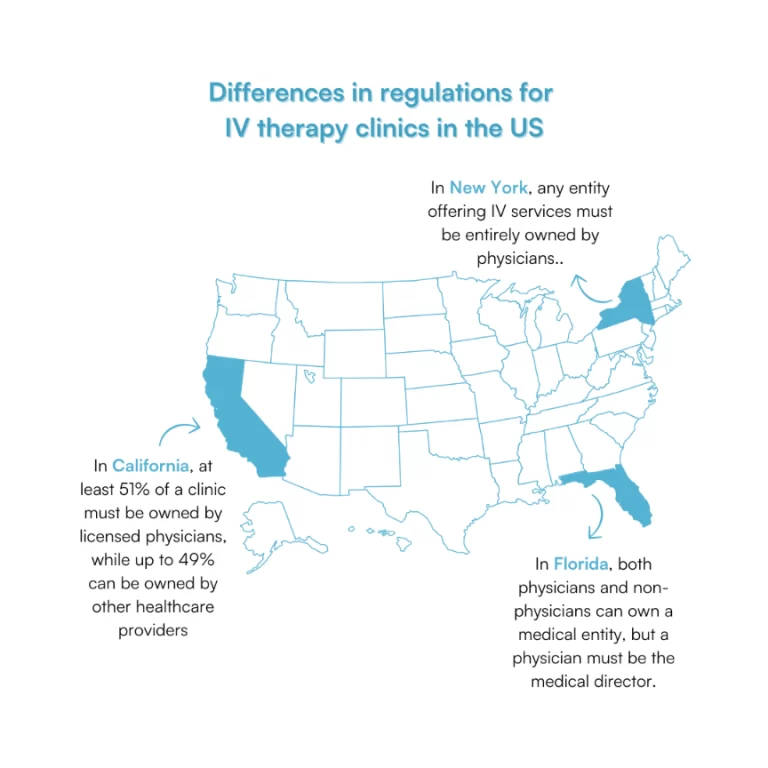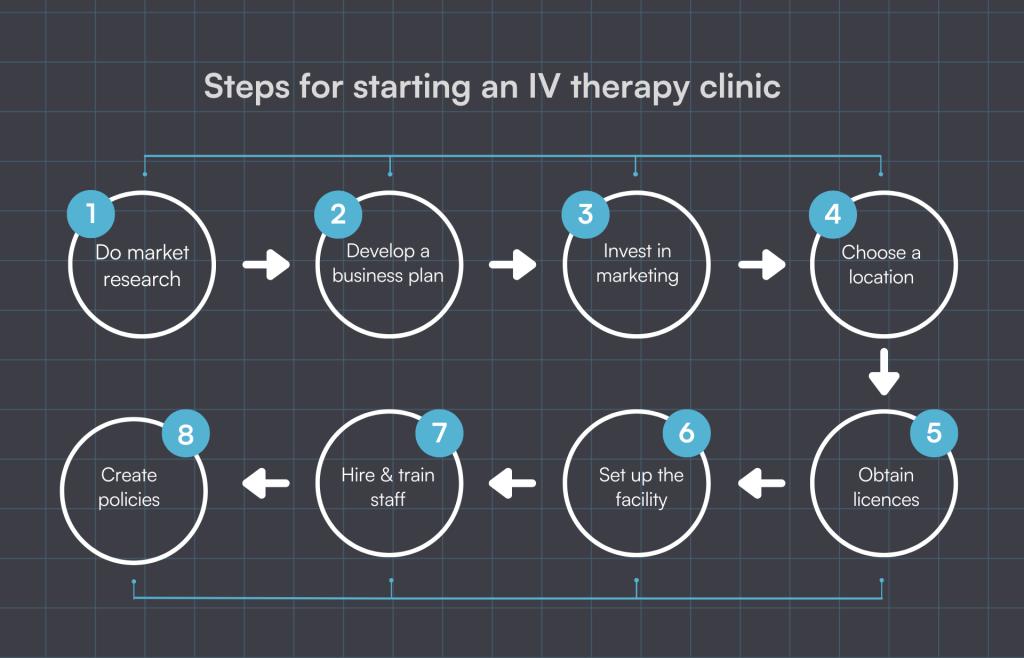Prioritizing your health is more than just a trend, and it’s easy to see why IV hydration and wellness centers have surged in popularity in recent years.
IV therapy offers a quick fix for many health-related issues, so it’s no wonder Hollywood stars such as Rihanna, Hailey Bieber, and John Legend have a couple of IV clinics on speed dial after world tours or long working weeks on set.
According to research conducted by IBIS World, industry revenue has constantly been increasing. The US IV therapy market reached $2.1 billion in 2024, a significant spike compared to 2022 when the industry revenue was $941M.
💭 What are the uses of IV therapy?
- Fatigue
- Jet lag
- Migraines
- Dehydration
- Immune system boost
- Cold and flu recovery
- Reducing inflammation
- Hangover recovery
Who can start an IV hydration clinic?
IV hydration clinics may be on the rise, but these businesses are still medical facilities, and strict regulations are set for how they should operate.
The first thing you should consider is the laws and regulations. In the US, rules about who can start an IV hydration clinic can vary significantly from state to state, while the UK operates under different authorities.
Generally, a licensed physician must be present at the clinic, and in some instances, an IV drip cannot be administered without their supervision.

The rules and laws differ slightly from one state to another. Here a couple of IV therapy regulation examples:
- California: A licensed physician or a group of physicians must own at least 51% of the clinic. The rest, up to 49%, can be owned by other healthcare providers such as nurse practitioners or physician assistants.
- Florida: Both physicians and non-physicians can own a medical entity. However, a physician must be the medical director to ensure the physician-patient relationship is upheld.
- New York: Any entity (as in, a business) providing IV services must be completely owned by a physician or a group of physicians.
- UK: While the owner doesn’t necessarily have to be a medical practitioner, the business must register with the CQC to operate and administer IV drip services because this type of treatment is in scope with the CQC.
Legislation in several states has tightened up recently in response to incidents at poorly regulated IV clinics, where underqualified staff led to tragic outcomes for patients.
Requirements for starting an IV therapy clinic
Now that we’ve determined who can open an IV therapy clinic, it’s time to get into the specific requirements needed to establish your IV drip therapy clinic.
Licensing and medical oversight
Among the numerous licensing requirements, one is considered the key element to opening your own IV therapy clinic — having a licensed medical practitioner on board. More often than not, they are the medical directors of the facility.
The rules might be different depending on the state you reside in. In some instances, a licensed physician must be appointed the medical director, while in other states, the licensed practitioner only needs to provide oversight.
Medical oversight means supervising and guiding medical care to ensure it’s safe, effective, and meets standards. It involves experienced healthcare professionals monitoring other medical staff to ensure quality care and reduce errors.
Another crucial thing to remember when opening an IV drip clinic is to make sure you get insurance. Medical facilities most often get insurance that covers:
- General liability
- Professional liability
- Equipment insurance
This way, you can rest assured that you’ll be protected in case of any malpractice claims or similar liabilities.
Being HIPAA (Health Insurance Portability and Accountability Act) compliant is crucial. HIPAA is a law that protects patients’ private health information and ensures it stays confidential. It also gives patients rights over their health information and sets rules for how it can be used and shared.
Learn how Bank MediSpa optimized operations with Pabau’s secure digital patient record system.

Facility and equipment
Choosing the right facilities for your IV therapy clinic is crucial. Ensure it has both a prep room and a patient room, as well as a reception area.
You’ll need to quip the clinic with essential supplies like IV components (catheters, IV bags, medical equipment), emergency supplies, a medical refrigerator, wheel carts, and oxygen tanks.
During the licensing process, you’ll get a detailed list of required equipment and facility standards.
Staffing
Professionals such as licensed physicians, nurse practitioners, registered nurses, and physician assistants are typically qualified to administer IV therapy. Of course, these staff members must have the necessary education and certifications.
In addition to the medical staff administering the IVs, you may also need an experienced front-of-house team, a practice manager, and even a marketing hire to ensure that you’re able to deliver a great client experience from start to finish.
You don’t always have to hire more people, though. Practice management software like Pabau is packed with features that make running a healthcare business easier, with a lot of options to use to your advantage.
Who is qualified to insert an IV?
Circling back to our earlier point, most states require an IV drip clinic to have a licensed practitioner as the medical director. Nurses need state-issued certifications and licenses.
To administer IV infusions, a nurse must have an RN license (a Registered Nurse license), which can be obtained with either an ADN (Associate Degree in Nursing) or a BSN (Bachelor of Science in Nursing) degree.
The following medical professionals are authorized to administer IV therapy:
- Licensed Physicians: Medical doctors with the necessary credentials and experience to oversee and administer IV therapy treatments.
- Nurse Practitioners (NPs): Advanced practice registered nurses who are trained and authorized to provide a range of healthcare services, including IV therapy.
- Registered Nurses (RNs): Nurses with the requisite training and certification to administer IV treatments under the supervision of a licensed physician or NP.
🗒 Note: Licensed practical nurses (LPNs), Licensed vocational nurses (LVNs), and Physician Assistants (PA) with extra training and authorization from an RN or physician can start intravenous therapy. In some states, EMTs (Emergency Medical Technicians) or paramedics are also permitted to administer IVs.
According to an article by American Med Spa, there are a few differences between states regarding who is able to administer IV therapy. Here are some examples:
- California: An RN can administer IV therapy, as long as they’re being supervised by a physician, a PA, or an NP. LVNs need special courses and certification before being allowed to administer IVs.
- New York: Similar to California, an LPN must be under the supervision of a physician, PA, NP, or RN.
- The UK: Unless certified as a registered practitioner by the CQC, the business must cease all IV administering.
Business and financial management
Establishing a solid business plan and financial management practices is crucial for any business, including an IV infusion therapy clinic.
As with any business, there are start up costs to consider. While the revenue potential might have drawn you in, steady financial management will keep you afloat. Unexpected costs will pop up, no matter how carefully you plan.
Make sure you have a system to keep track of overheads like equipment, consumables, staff pay checks, and operational costs. Consistently track your finances, prioritize budgeting, and make wise investments as you grow.
Remember, slow and steady wins the race.
Operations management
Managing clinic operations can be challenging.
You’ll need to manage bookings, keep up-to-date client records, collect intake forms and medical questionnaires before appointments, and follow up with pre-care and post-care. A paperless approach could be your best strategy.
If you’re operating from a mobile clinic or you do home visits, you can keep track of everything remotely and manage your start-up clinic from wherever you are.
Here’s the good news: Pabau is practice management software, specifically developed for IV clinics, med spas, and other healthcare businesses. Its sole mission is to help you operate efficiently and scale your business.
Steps for starting an IV therapy clinic

After understanding the legal requirements, the next step is to bring your business idea to life by building it from the ground up. Here are some key steps to focus on:
Develop a business plan
Create a business plan that outlines your services, financial projections, budgeting strategies, and marketing approaches. If this isn’t you area of expertise, hiring a consultant might be a good option for your start-up.
Invest in marketing and promotion
With everyone chronically online, marketing and promotion are truly important parts of owning and managing a business.
💵 Put resources aside for marketing to grow your client base. Despite the growing popularity of IV therapy clinics, effective marketing remains crucial.
💻 Establish a robust online presence through a well-optimized and professional-looking website, and active social media channels.
🗞 Our advice includes sending out newsletters, developing a review strategy, setting up gift vouchers and packages, and responding to clients online.
Choose a location
Choose a strategic location that’s accessible, visible, and meets health and safety standards.
For IV therapy clinics, you can either operate a full-time facility with home visits or opt for a mobile clinic.
Mobile IV hydration services have often operated in a gray area without clear guidance on licenses or permits.
However, states are gradually creating stricter regulations. For instance, in Virginia, businesses offering home IV infusion services must secure a Home Care Organization (HCO) license from the Virginia Department of Health.
Obtain necessary licenses and permits
Since IV therapy clinics are considered medical facilities, they must comply with regulations such as HIPAA and CMS (Centers for Medicare and Medicaid Services). You must also implement systems for managing patient records and provide staff training on compliance requirements.
Set up the facility
If you’ve already picked a location, the hard part is over. But even after getting all the necessary equipment, you still need to create a welcoming environment.
Make your clinic client-friendly. Clients should feel comfortable and safe, even if they’re coming in voluntarily. They might still be anxious or stressed.
Hire and train staff
Your staff will be the face of your clinic. Recruit qualified, experienced individuals who match your brand’s values and who can deliver exceptional care.
Provide training to ensure they deliver great customer service.
Develop policies and procedures
Establish clear operating procedures, emphasizing client care, safety protocols, compliance standards, and consent form processes.
Having clear documentation of your policies and procedures is really important for any clinic. What is your policy if a client no shows on a appointment – do you have a booking or a cancellation policy? What if you receive a complaint? If you have a documented process in place your team will know how to handle it.
Having robust client records also helps to protect your clients, and your business. That way, if you’re dealing with a difficult client, you’ll be able to evidence that there was no malpractice or negligence on your end.
How profitable is an IV hydration business?

And now, the fun part — money and profit.
According to an article by IV Therapy Academy, the best-case scenario for starting an IV drip clinic is making an estimated profit of $210,000 annually.
The math behind this is simple: if you have four or five sessions booked in per day (with a single IV hydration session costing $280 on average), the annual revenue could reach $410,000, with $140,000 solely in profit.
However, as your business grows and you start booking eight to ten clients daily, your annual revenue could grow to $600,000, with a $210,000 profit.
Naturally, as your business scales, these numbers will grow as well, so use these numbers to get a general idea of the revenue/profit information.
Streamline your clinic operations and patient management with Pabau
There you have it — the entire process of starting an IV therapy clinic, along with some key tips. Our final tip is to consider using an all-in-one practice management software like Pabau, which can help in many ways…
🗓 Online bookings with an advanced scheduling system: Don’t limit appointments to phone bookings. Pabau’s calendar helps prevent double-booking and keeps all necessary information at your fingertips.
📝 Client records accessible anywhere: Whether you run a mobile clinic or offer home visits, you’ll have access to client records from anywhere in the world.
🧑💻 Automated intake forms and medical questionnaires: Pabau sends these to patients once they schedule an appointment, and the information gets automatically added to their client record.
🪙 Built-in marketing features: Skip the hefty invoices from marketing agencies. Pabau has a number marketing features included in the system at no extra cost, including a gift vouchers, loyalty program, email campaigns, and packages.
Pabau helps you save time, practice safely, and scale your business. Say goodbye to manual work and grow your business, without the need for pen and paper.
Ready to launch your IV therapy clinic with Pabau by your side? Book a demo today!





